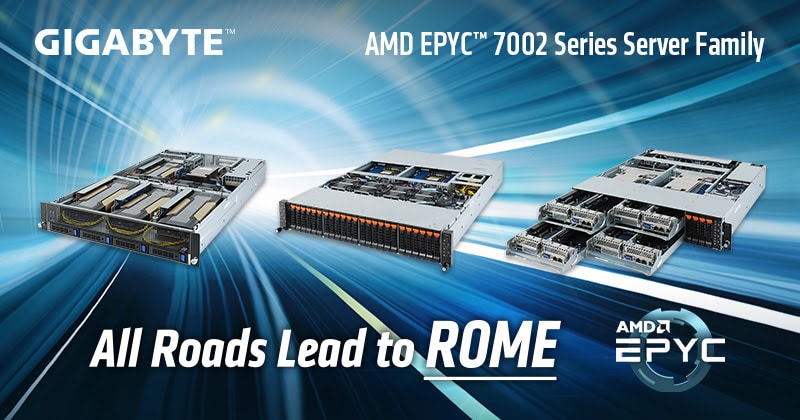GIGABYTE has announced the expansion of its AMD EPYC 7002 Series Server Family. Six new unique single socket AMD EPYC 7002 server systems have been unveiled. This release follows the launch of 17 new AMD EPYC 7002 Series server platforms that were announced simultaneously with AMD’s official launch of the new generation data center processor last month. These new models have been created specifically for the 2nd Generation AMD EPYC 7002 Series processor with each system featuring unique configurations and components.

Gigabyte has a strong partnership with AMD and is a leading systems vendor for the EPYC 7000 Series platforms. With these six new systems being the second wave of lineup released, the GIGABYTE EPYC 7002 portfolio totals nearly 30 systems and includes rack mount servers, GPU servers, and high density multi-node servers. Offering a large and diverse portfolio GIGABYTE looks to be a top vendor in the AMD EPYC 7002 Series system market.
These new systems are single socket solutions offering groundbreaking benefits. A single EPYC 7002 Series processor offers the performance of a two socket system without limitations to I/O or memory bandwidth seen traditionally with one socket systems. This offers customers the benefit of lower monetary expense, lowered power consumption, and decreased licensing costs for software. Additionally, they systems are ideal to use with AMD’s “P” version EPYC SKUs which is another appealing aspect for customers looking for the best value and bang for their buck.
R162-Z10 / Z11: 1U 3 x NVIDIA T4 Server
The R162 Series features high performance storage and expansion capacity in a compact 1U chassis. 128 PCIe lanes of I/O provided by the EPYC 7002 Series allow the R162-Z10 to support up to ten 2.5” hot swap flash drives at the front of the system. In addition, the R162 Series features three low profile PCIe 3.0 x16 expansion slots in the rear, which can be used to support three NVIDIA T4 GPU cards, making the R162 ideal for diverse CPU / GPU computing workloads in VDI, inferencing or deep learning.
G242-Z10: 2U 4 x GPU System
The G242-Z10 is a 2U system built for GPU computing workloads. It utilizes EPYC’s 128 PCIe lanes of I/O to offer four PCIe Gen 3.0 x16 expansion slot bays for GPUs, storage availability for four 3.5” hot swap SATA / SAS drives in the front, two 2.5” hot-swap flash drives in the rear, and two onboard M.2 slots. This system is extremely flexible and can be used with a diverse range of active or passive cooled GPU cards. Each GPU bay has a height of 1.5U with well designed airflow characteristics.
H252-Z10: 2U Single Socket Multi-Node Server
GIGABYTE is releasing a single socket version aimed for enterprise workloads following the success of the H262 Series dual socket 2U 4 node servers. The H252-Z10 features four hot-plug single socket node trays accessed from the rear, and twenty-four 2.5” hot plug NVMe drive bays at the front (with six assigned to each node).
Each single socket node also features three PCIe Gen 4.0 & Gen 3.0 expansion slots, allowing customers to utilize an excellent balance of cost efficient processor power (using AMD EPYC’s “P” Series SKUs), memory, high speed storage and LAN connectivity. It also includes features common with the H262 Series such as a CMC module and CMC LAN port for improved ease of management and reduction of cabling.
H242-Z10 / Z11: Multi-Node AMD EPYC Edge Server
With today’s era of 5G connectivity and cloud services there is an increased need for more data to be transmitted, processed, and delivered back to the user almost instantaneously. Also, it’s becoming more important to deliver better computing power at the edge of the network to reduce latency and response times.
The AMD EPYC multi-node system is designed for edge computing. The H242 Series packs dense compute capabilities into a half-depth chassis designed for restricted space deployments such as a telecommunications cabinet. Each 2U chassis features four half depth, hot pluggable node trays, featuring a single socket AMD EPYC processor as well as ample memory, expansion and high speed flash storage capacity, and is available in two different configurations: H242-Z10 with rear access sliding node trays, and H242-Z11 with front access sliding node trays. This system is ideal for organizations who wish to distribute their computing capabilities across the world, not only relying on a centralized data center but also installations in server rooms or cabinets in their regional or local offices to reduce latency and improve the quality of their online services.
These six new single socket systems bring the groundbreaking technology of the AMD EPYC 7002 Series Processors to the market in a wide range of form factors and configurations. These new solutions have been designed to meet the needs of customers in enterprise, cloud, and edge computing. Overall these systems offer customers decreased costs with increased performance.




 Amazon
Amazon